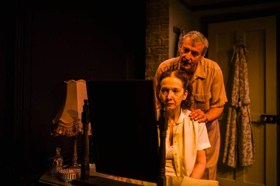Review: A LESSON FROM ALOES, Finborough Theatre

![]() All these years on, whenever I go through Trafalgar Square, my head instinctively turns to look for the 24 hour protest outside South Africa House, its noisy celebration of the largeness of life a rebuke to the slab-faced bureaucrats within, dedicated to preserving its smallness. Spitting Image's "I've never met a nice South African" summed up both the prevailing view of the Afrikaaner and the intransigence of their pariah state.
All these years on, whenever I go through Trafalgar Square, my head instinctively turns to look for the 24 hour protest outside South Africa House, its noisy celebration of the largeness of life a rebuke to the slab-faced bureaucrats within, dedicated to preserving its smallness. Spitting Image's "I've never met a nice South African" summed up both the prevailing view of the Afrikaaner and the intransigence of their pariah state.
Of course, the Apartheid regime was to collapse in the 1990s and there were nice South Africans, brave black and white men and women working to bring the country into the 20th century before the world entered the 21st. We're with a couple of such men back in 1963, when the sun shone and the sjambok swung.
Piet is an Afrikaaner whose current obsession is the collection and naming of indigenous aloes, the spiky leaves of which poke through the scorched earth of the land he loves.
He's awaiting the arrival of an old comrade, Steve, a "Cape Coloured" in the inhuman taxonomy of the time, who has felt the lick of the sjambok and is now leaving the land he also loves, bound for England, where his family's future is uncertain, but better than it would be in his homeland.
Meanwhile, Piet's wife, Gladys, is recovering from a nervous breakdown - more specifically, the brutal electro-convulsive therapy in vogue at that time.
The three circle each other, damaged by time, damaged by secrets and doubts, damaged by a dysfunctional political system that bleeds into the hearts and souls of those it crushes - one way or another.
Athol Fugard's play has not been seen in 35 years so we have its director, the celebrated Janet Suzman, to thank for its revival at a time when politics is as dysfunctional as it has been in the intervening time and the impact of social conflict on mental health never more discussed, if just as intractable.
All three are suffering.
Piet quotes his poetry and tends his garden, but it's all displacement activity, his ostracising by his old radical friends (who suspect the white man amongst them of being an informer) proving an internal exile that hurts him all day, every day.
Gladys's moods swing up and down, wishing the conflict would go away, projecting her longing for her old, simpler life on to the diaries confiscated in a police raid. The state first took her heart and now takes her mind.
Steve has given up on change ever coming to his nation, given up on Piet (the doubting of whom proving sufficient to break their relationship) and given up on goodbyes - he walks away with just a glance back.
The tiny stage works perfectly for Norman Coates' backyard set - we feel the glare of the sun, the stifling heat, the claustrophobic paradox of being trapped in a huge and beautiful country.
Dawid Minaar gets the showy stuff right with his reciting of rebel songs and Shakespeare, but he does much of his best work when Piet falls silent, standing still looking at his wife and his friend, the words coming less easily when his own brain must animate them.
Janine Ulfane gives us a Gladys who is fragile and friendless, lonely and longing for a time when politics was a sideshow and not the cruel earth on which she must scratch an emotional living.
DAVID RUBIN fizzes and struts as Steve - we see the orator, we see the threat his charisma posed to the state and we see his resignation to his fate. He may not have accepted the police's invitation to jump from the fifth floor physically, but they knew (and he knows) that, mentally, he has done exactly that.
"No normal sport in an abnormal society" was the rallying cry of the decades long international boycott of South African sportsmen and sportswomen. As Fugard so eloquently shows us, "No normal life in an abnormal society" was less a slogan and more a description of the long days spent in the shadow of the Apartheid regime.
A Lesson From Aloes continues at the Finborough Theatre until 23 March.
Photo Alixandra Fazzina
Reader Reviews

Videos
